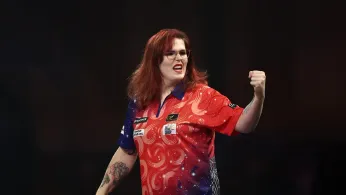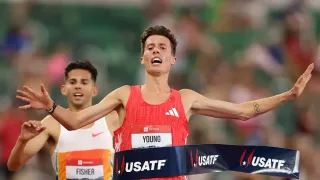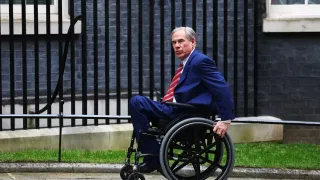
3 hours ago
Trans Darts Champion Noa-Lynn van Leuven Calls WDF Ban on Trans Women ‘A Loss for the Trans Community’
READ TIME: 3 MIN.
The international darts community is grappling with controversy after the World Darts Federation (WDF) announced a new policy barring transgender women from women’s competitions. The rule, implemented in late July, restricts participation to athletes assigned female at birth, effectively excluding transgender women regardless of their current gender identity or compliance with previous regulations. The decision, part of a growing trend in international sports, has drawn swift and poignant criticism from athletes and advocates for LGBTQ+ inclusion.
Dutch champion Noa-Lynn van Leuven, 28, who has achieved historic milestones as an openly transgender competitor, was among the first to respond publicly. In a statement shared via Instagram, as well as in comments to the press, Van Leuven declared, “This decision does affect me personally — though, thankfully, not too severely at this point in time. But still, it hurts. It is another loss for the trans community in sport. That breaks my heart. As a trans person in the darts world, I know how important inclusion is—not just on paper, but also in practice” .
Van Leuven’s exclusion from WDF women’s tournaments marks a significant moment for her career and for the visibility of transgender athletes in darts. She remains eligible to compete in Professional Darts Corporation (PDC) events, where she has already made history as the first Dutch woman to qualify for the PDC World Championship and competed at the Women’s World Matchplay in Blackpool on July 28 . Still, the new WDF policy disrupts her ability to participate in key international events and highlights the ongoing challenges faced by transgender athletes navigating shifting eligibility standards.
Reflecting on the broader implications, Van Leuven said, “It’s disheartening to see another policy built around so-called ‘fairness’ that ends in exclusion. My heart goes out to all the athletes affected” .
The WDF’s decision reflects a wider trend across international sports, as governing bodies revisit eligibility rules for transgender women. Organizations such as World Athletics and World Aquatics have also moved to exclude transgender athletes who underwent male puberty from women’s competitions, citing concerns about fairness and competitive balance. However, these bans have faced sustained criticism from LGBTQ+ advocacy groups, who argue that such policies reinforce stigma and deny transgender people equal opportunities in sport .
Van Leuven’s case is further complicated by the fact that she had met the requirements set by the Darts Regulation Authority (DRA), which oversees the sport more broadly and allowed her to compete as a woman. The new WDF policy, however, overrides these standards for its own competitions, raising questions about the lack of consistency across governing bodies and the impact on athletes’ careers .
The reaction within the LGBTQ+ community and among allies has been one of disappointment and determination. Van Leuven’s statement emphasized resilience: “We remain visible. We keep going” . LGBTQ+ sports advocates have reiterated the importance of policies that consider both fairness and inclusion, urging federations to consult with affected communities and base decisions on science and lived experience, rather than fear or misinformation.
As sports organizations around the world contend with the complexities of gender and competition, the visibility and voices of athletes like Van Leuven remain vital. Her achievements, both on and off the oche, continue to challenge stereotypes and inspire progress toward a more inclusive sporting landscape.
While the WDF decision stands, the debate over transgender participation in sports is far from settled. For Van Leuven and many others, the fight for equality and respect—in darts and beyond—remains ongoing.






